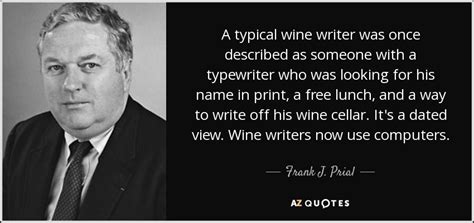A Quote by Garrison Keillor
People meet writers and are bowled over when the writer is friendly to them and invites them to his house for a glass of wine or to shoot up heroin or whatever they do, and they talk their heads off, and a year later it comes out in a book, and there follow years of bitter and fruitless litigation, and that is why you should always keep a writer at arm's length.
Related Quotes
The writer is the duelist who never fights at the stated hour, who gathers up an insult, like another curious object, a collector's item, spreads it out on his desk later, and then engages in a duel with it verbally. Some people call it weakness. I call it postponement. What is weakness in the man becomes a quality in the writer. For he preserves, collects what will explode later in his work. That is why the writer is the loneliest man in the world; because he lives, fights, dies, is reborn always alone; all his roles are played behind a curtain. In life he is an incongruous figure.
But we should ask the question: Why should a writer be more than a writer? Why should a writer be a guru? Why are we supposed to be psychiatrists? Isn't it enough to write and tell the truth? It's not like telling the truth is common. Writers are the earthworms of society. We aerate the soil. That's enough.
I believe the only way a writer can keep himself up to the mark is by examining each story quite coldly before he starts writing it and asking himself if it is all right as a story. I mean, once you go saying to yourself, 'This is a pretty weak plot as it stands, but I'm such a hell of a writer that my magic touch will make it okay,' you're sunk. If they aren't in interesting situations, characters can't be major characters, not even if you have the rest of the troop talk their heads off about them.
I was writing everything. I grew up in Albany, New York, and I was never any farther west than Syracuse, and I wrote Westerns. I wrote tiny little slices of life, sent them off to The Sewanee Review, and they always sent them back. For the first 10 years I was published, I'd say, "I'm a writer disguised as a mystery writer." But then I look back, and well, maybe I'm a mystery writer. You tend to go where you're liked, so when the mysteries were being published, I did more of them.
One of the most useful parts of my education as a writer was the practice of reading a writer straight through - every book the writer published, in chronological order, to see how the writer changed over time, and to see how the writer's idea of his or her project changed over time, and to see all the writer tried and accomplished or failed to accomplish.
Oh, I love labels, as long as they are numerous. I'm an American writer. I'm a Nigerian writer. I'm a Nigerian American writer. I'm an African writer. I'm a Yoruba writer. I'm an African American writer. I'm a writer who's been strongly influenced by European precedents. I'm a writer who feels very close to literary practice in India - which I go to quite often - and to writers over there.
Pretty much all comic-book people, like all Hollywood people, for the most part, are pretty liberal. I think especially UK writers. Alan Moore is probably the most radical guy you'll ever meet. I grew up loving those guys, so my heroes, as a kid, were radical cartoonists, essentially. I couldn't help but - I grew up in a left-wing household. But I do think it's fun, writing right-wing characters. I've found it interesting, just as a writer, to get inside their heads and make them likeable.
The Revelation was my master's project, and after I finished it, I thought I'd send it off to a publisher and within a year or so be a rich and famous writer. Two years later I finally sold it. For a whopping $4,000. A year after that, it finally came out. Which explains why there are all those terrible jobs on my resume!
There were always men looking for jobs in America. There were always all these usable bodies. And I wanted to be a writer. Almost everybody was a writer. Not everybody thought they could be a dentist or an automobile mechanic but everybody knew they could be a writer. Of those fifty guys in the room, probably fifteen of them thought they were writers. Almost everybody used words and could write them down, i.e., almost everybody could be a writer. But most men, fortunately, aren't writers, or even cab drivers, and some men - many men - unfortunately aren't anything.
The writer learns to write, in the last resort, only by writing. He must get words onto paper even if he is dissatisfied with them. A young writer must cross many psychological barriers to acquire confidence in his capacity to produce good work-especially his first full-length book-and he cannot do this by staring at a piece of blank paper, searching for the perfect sentence.





































